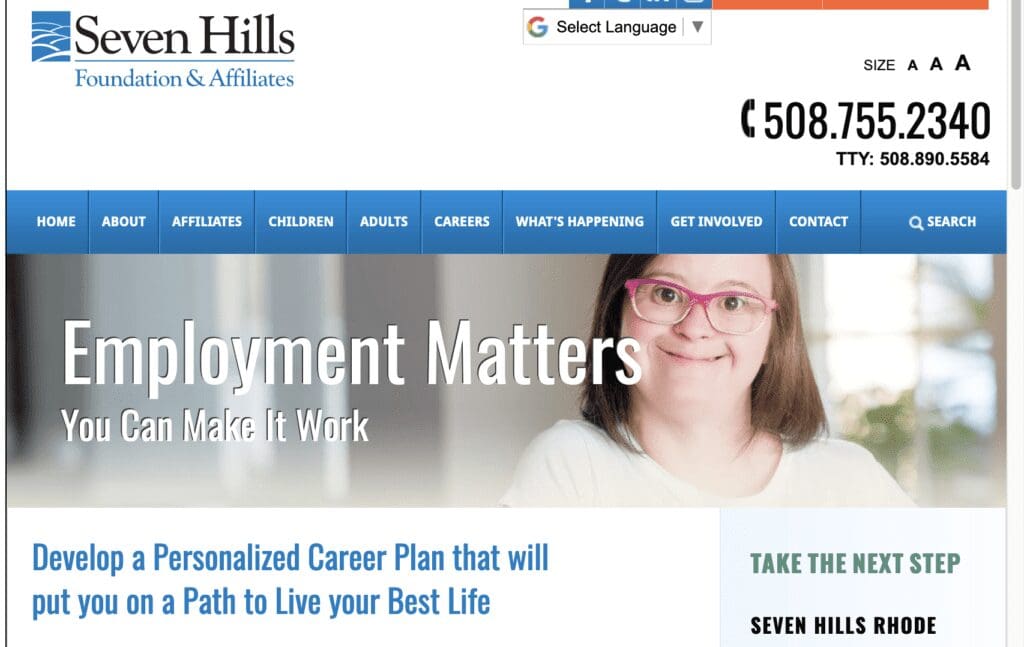Search Posts
Recent Posts
- Outdoors in RI: Help keep recreation areas clean. Invasive Milfoil, trash. 2A update – Jeff Gross July 26, 2024
- Real Estate in RI: Highest-ever sale in Queen’s Grant, EG $1.25M, by Residential Properties July 26, 2024
- Homeless in RI: Gov. Newsom issues Executive Order. Remove California’s encampments. July 26, 2024
- Let the games begin. XXXIII Summer Olympics – John Cardullo July 26, 2024
- GriefSPEAK: What would you do? – Mari Dias Nardolillo July 26, 2024
Categories
Subscribe!
Thanks for subscribing! Please check your email for further instructions.

Business Beat: Customized employment for people with disabilities
Seven Hills Rhode Island, based in Woonsocket, has implemented and improved upon a unique system of job placement for members of the Intellectual or Developmental Disabilities community here in Rhode Island. With funding from a Person-Centered Supported Employment Performance Program (PCSEPP) 3.0 grant from The Department of Behavioral Healthcare, Developmental Disabilities and Hospitals (BHDDH), they’ve championed the person-centered employment concept that includes deploying a multi-faceted plan designed to accurately determine and match the needs of the employer with the very clearly identified skills, talents, interests, and even preferences of the prospective employee.
It’s not about a well-crafted resume, complete with search-optimized keywords. Nor is it a response to a company’s job posting. Instead, the person-centered program carefully explores both the individual job seeker’s unique abilities and desires well as the company’s requirements at a level of detail that eludes a typical posting.
According to program director Melissa Charpentier, “Customized Employment is not just for people with developmental disabilities. In fact, I think it’s going to be the wave of the future. As the labor market gets tighter and tighter, attracting the best applicants is more difficult. It’s such a benefit for businesses. We go into the business to see how to fill their needs, offer a fresh set of eyes to help determine their needs and offer new insights, and become a real asset for the business.” Clearly, this is very different from reviewing and responding to the traditionally posted “Want Ads.”
She notes that often a “typical” job description may discuss many areas of the business, but they may not pertain to the applicant or even truly the business’s actual needs once explored in depth.
Ms. Charpentier notes: “Customized employment is a little different from traditional and supported employment services.” Turns out, that’s quite an understatement.
The customized employment program is based on working with one individual at a time, exploring in detail their transferrable skills, and even their avocational interests, such as uncovering interests in photography, sports, or becoming an advocate. This holistic approach is an important element helping employees find a satisfactory job while cultivating a full life and helping employers hire an ideally matched candidate.
Ms. Charpentier’s explanation sets the goals and the tasks of program apart from others. “This program is not about developing several jobs at once; it is certainly not a training program for retail. We consider the needs of each, and the team meets them where they’re at.”
Particularly noteworthy is that according to this team, customized employment is not just for job seekers with disabilities. The job search is different. The interview process fosters exploration of the needs of both parties. Performing tasks is a bit different, perhaps in scheduling but similar in the exploration of goals and needs.
Eliminating a one size fits all in favor of a mutually beneficial working relationship is a win-win for the future of employer-employee relationships. All the better to create a true and lasting asset for the hiring company.
This customized employment grant had specific requirements about who could participate in this round, such as those who have never been previously employed. This process, and the outcomes – employment to a fuller and better life for people with developmental disabilities – make Charpentier’s comment prophetic. If this becomes the wave of the future, it is likely to be embraced by every employer and employee.

What is the Detailed Employment Process?
“Discovering personal genius” is among the team’s tasks, not merely a mantra uttered by idealists. Discovery is a unique process offered by Griffin Hammis Associates, complete with staff training and job seekers participating in discussions, all of which requires a few months. Typically, there is a sixteen-week Association of Community Rehabilitation Educators (ACRE) training program to become familiar with the various processes, and a forty hour certification program customized employment, which everyone on the team acquired.
There are six weeks working with job seeker, with weekly feedback, while the team facilitated the discovery process. The second part is the mentoring platform, 16 weeks. where each staff worked with a particular job seeker, and each was mentored by national expert, Doug Crandall. Throughout the process they were discussing real life situations, such as what challenges and opportunities are likely in each potential work scenario. For the team, group exercise, brainstorming, and feedback translated into the collective genius which helped the group.
Part of the discovery process includes informational interviews with businesses which funnels down to three vocational themes for each participant. Initially, the experience focuses on learning about an industry and businesses within the industry. Once a participant completes the discovery process, and what is known as the “ideal conditions of employment,” twenty companies make the list as being a potentially good fit.
Internships often follow, preferably paid directly by the company, or are otherwise funded for a short term by the grant. At times, however, a participant is hired immediately for the job. Meanwhile, the job developer maintains relations with key contacts from five of the companies, trying to make inroads on behalf of the participant and fine-tuning the business’s unmet needs. .
In addition, the process includes making community connections, looking at the work culture, to determine whether the job seeker potentially fits in. Such considerations include assessing whether the job is quick-paced, or repetitive, or matches well with someone’s personality and ideal schedule. Other factors considered might be whether there are common social and cultural interests, such as being sports fan or book lovers – where the candidate feels comfortable. One of the primary goals of the program is to facilitate compatibility in the matching process as it helps to ensure the success of the candidate.
Beyond a job, most of the participants have many new tools that accompany them in future pursuits: a visual resume, assistive technology, support network of people, other hobbies, interests and perhaps groups and communities that they’ve joined. These are significant tangible and intangible benefits.
_____
